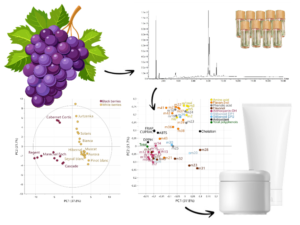1 Department of Organic Chemistry and Technology, Faculty of Chemical Engineering and Technology, Cracow University of Technology, Warszawska 24, 31-155 Kraków, Poland
2 EA 2106 «Biomolécules et Biotechnologie Végétales», UFR des Sciences Pharmaceutiques, Université de Tours, 31 av. Monge, F37200 Tours, France
3 Department of Plant Biotechnology and Medicinal Fungi Faculty of Pharmacy, Jagiellonian University, Medical College, Medyczna 9, 30-688 Kraków, Poland
4 Rolniczy Zakład Doświadczalny Łazy, Jagiellonian University, Gołębia 24, 31-007 Kraków, Poland
5 Institut de Chimie Organique et Analytique, Université d’Orléans-CNRS, UMR 7311 BP 6759, CEDEX 2, 45067 Orléans, France
Correspondence to: magdalena.malinowska@pk.edu.pl; arnaud.lanoue@univ-tours.fr
 Natural product effectiveness is an important criterion to develop new active ingredients for cosmetic industry. Plant metabolites exhibit wide range of natural activities and in recent years, there has been a growing interest in the development of plant-based cosmetic products. The complex composition of plant extracts and their natural variability makes it difficult to select and produce plant-based natural ingredients with the most effective and constant biological capacity. Grapevine (Vitis vinifera L.) is known for its abundance in bioactive polyphenols, but the quality and the quantity in polyphenols vary depending on several parameters including the variety, the geographical origin, the year, and the extraction methods. In the temperate regions of Central Europe, there is currently significant growth in the cultivation of grape varieties that are well-suited to the humid and cool climate. Interestingly, these fungus-resistant varieties exhibit a specific metabolic composition associated to climatic adaptation, paving the way for the development of new active ingredients for skincare. Metabolomics aims to detect, identify and quantify small molecules in living system in response to environmental changes. In this literature review, we present the advantage of metabolomic approaches to evaluate the cosmetic potential of fungus-resistant varieties cultivated in Central and Eastern Europe.
Natural product effectiveness is an important criterion to develop new active ingredients for cosmetic industry. Plant metabolites exhibit wide range of natural activities and in recent years, there has been a growing interest in the development of plant-based cosmetic products. The complex composition of plant extracts and their natural variability makes it difficult to select and produce plant-based natural ingredients with the most effective and constant biological capacity. Grapevine (Vitis vinifera L.) is known for its abundance in bioactive polyphenols, but the quality and the quantity in polyphenols vary depending on several parameters including the variety, the geographical origin, the year, and the extraction methods. In the temperate regions of Central Europe, there is currently significant growth in the cultivation of grape varieties that are well-suited to the humid and cool climate. Interestingly, these fungus-resistant varieties exhibit a specific metabolic composition associated to climatic adaptation, paving the way for the development of new active ingredients for skincare. Metabolomics aims to detect, identify and quantify small molecules in living system in response to environmental changes. In this literature review, we present the advantage of metabolomic approaches to evaluate the cosmetic potential of fungus-resistant varieties cultivated in Central and Eastern Europe.
fungus-resistant grapevine cultivars; PIWI, metabolomics, polyphenolic profile, cosmetic activity
